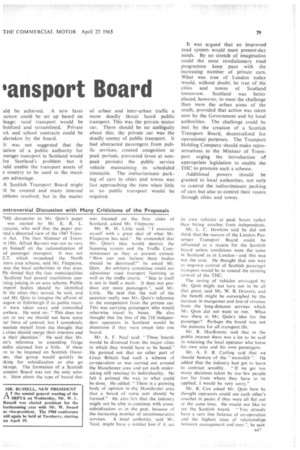controversial Discussion with Many Criticisms of the Proposals
Page 81

If you've noticed an error in this article please click here to report it so we can fix it.
'HE discussion to Mr. Quin's paper was started by Mr. E. R. L. zpayne, who said that the paper prelted a distorted view of the 1947 Transrt Act. The then Minister of Transit (Mr. Alfred Barnes) was not so very en himself on the nationalization of ad passenger transport. It was not E.T. which torpedoed the North Stern area scheme. said Mr. Fitzpayne. was the local authorities in that area. He denied that the four municipalities Scotland had passed resolutions conrning joining in an area scheme. Public nsr■ort bodies should be identified th the cities they served, he said, and ted Mr. Quin to imagine the affront of asgow or Edinburgh if its public trans: rt were taken away and controlled ewhere. He went on: "This does not :an to say we should not have some ler form of control, but I completely isociate myself from the thought that .t cities should merge their interests and m their identities." He said that Mr. iin's reference to extending fringe nefits alarmed him a little. if these :re to be imposed on Scottish Omnises, that group would quickly be Acing for subsidization or else go nkrupt. The formation of a Scottish ansport Board was not the only solun. How about the type of hoard that
was focused on the. four cities of Scotland, asked Mr. Fitzpayne.
Mr. W. M. Little said: 1 associate myself with a great deal of what Mr. Fitzpayne has said." He contended that Mr. Quin's idea would destroy the licensing system and the Traffic Commissioners as they at present existed. "How can you believe these bodies should be destroyed?" he asked Mr. Quin. An advisory committee could not administer road transport licensing as well as the traffic courts. " Size in itself is not in itself a merit. It does not produce any more passengers", said Mr. Little. He said that the nub of the question really was Mr. Quin's reference to the competition from the private car. This was carrying passengers who would otherwise travel by buses. He also thought that the loss of the 210 independent operators in Scotland would be disastrous if they were swept into one hoard.
Mr. A. F. Neal said: "These boards would be divorced from the major cities in which they would have to be based." He pointed out that no other part of Great Britain had such a scheme of co-operation as was carried out around the Manchester area and yet each undertaking still retained its individuality. He felt it pointed the way to what could be done. He added: "There is a growing body of opinion in the Manchester area that a board of some sort should he formed." He also felt that the industry might not he able to continue with crosssubsidization as in the past, because of the increasing number of unrernunerative
services. A local authority, said Mr. Neal, might have a similar loss if it ..an its own vehicles at peak hours rather than hiring coaches from independents.
Mr. L. C. Hawkins said he did not think that the success of the London Passenger Transport Board could be advanced as a reason for the Scottish board unless conditions were the same in Scotland as in London—and this was not the case. He thought that one way to improve control of Scottish passenger transport would be to extend the existing control of the THC.
The saving of vehicles envisaged by Mr. Quin might not turn out to be all that great, said Mr. W. B. Dravers, and the benefit might be outweighed by the increase in manpower and loss of revenue from the long-distance services which Mr. Quin did not want Jo run. What was there in Mr. Quin's idea for the passenger? Perhaps the board was not the panacea for all transport ills.
Mr. R. MacKenzie said that in the public interest there was a lot to be said in retaining the local operator who knew his own area and his own passengers.
Mr. A. F. R. Carling said that we should beware of the "monolith ". He added that the industry had got to learn to contract sensibly. "If we get too many decisions taken by too few people too far from where, they have to ne applied, I would be very sorry."
Mr. R. Cox asked Mr. Quin how he thought operators could use each other's coaches in peaks if they were all flat out at the same time. He would not like to see the Scottish board. You already have a very fine balance of co-operation and the highest state of relationships between management and men ", he said.




































































































































